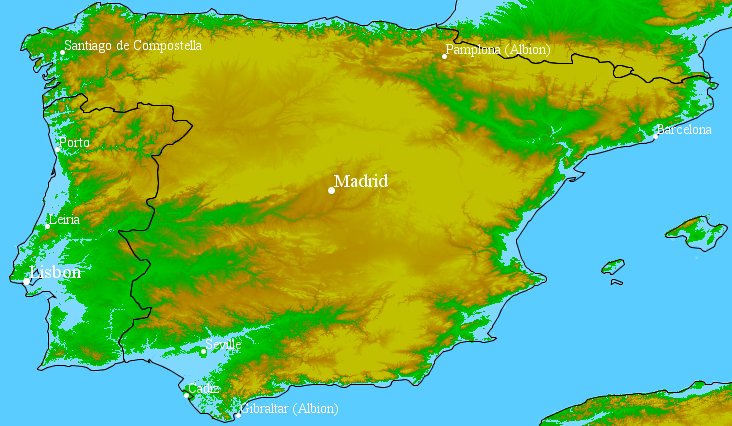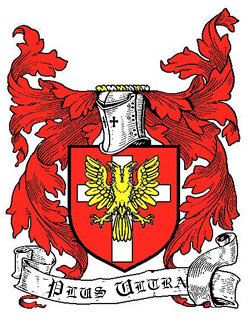The Kingdom of Navarre (Albion)
The King of Albion is also the King of Navarre since the Treaty of London 1606, soon after France traded their holdings in Navarre for an Alliance against Spain to once more reform the Kingdom. It is an odd mix, incorporating a population of Basques, Spanish, French and English most of whom do not necessarily get along too well with each other. The country itself is ruled in theory by King Matthew though in practice this is delegated to an Albion noble and the council of the Nobles of Navarre. The current representative of the King is the Earl of Warwick who is primarily tasked with ensuring that the people quibble quitely among themselves and don't make noise about independence, union with Spain or any kind of rubbish. The latter is rather unlikely as the Navarrese in general don't like being under anyone's rule and would rather have independence to have the freedom to fight among themselves.
The Rock of Gibraltar (Albion)
The Rock of Gibraltar was ceded by Spain to become an English naval base and port in the Mediterranean and has since become a safe haven for Albion shipping and the Venerable Order. The East India Company is traditionally charged with its maintenece and protection and the fort's governor is appointed from the Company. The post is currently occupied by Sir Henry Waswingham.
The Kingdom of Spain
The Kingdom of Spain is one of the major powers of Europe and despite the competition of France and England, remains a force to be reckoned with. A major colonial and trade power, it has capitalised on its gains in North America and competes with England, France and Portugal for land and resources. Though it has one of the largest and feared armies of Europe, England has defeated it successfully in war on several occasions and sent Spain into humiliation - something the Spanish do not take well.
When the Flood came, Spain remained remarkably unaffected and apart from some regions in the South and East, the vast majority of the land has remained above the waters. The Spanish claim that the Grace of God has saved them and their adherence to the One and True Catholic Faith preserved them from the Right Retribution of the Almighty. Cadiz, a major and famous port city (famous in Albion for being an excellent place to raid) was preserved from the advancing flood waters by some mysterious power. The inhabitants of Cadiz claim that the Love of God and the Blessed Virgin threw back the waters and raised their lands anew through the prayers of the monks, nuns, priests and lay peoples of the town. The Captains of the Venerable Order are convinced that God preserved Cadiz so that they might continue to live of its riches and virgins.
Spain remains as one of the few countries still unwilling to accept the equality of women. Though unrecognised in law, the state of equality has been grudgingly allowed.
His Most Catholic Majesty King Philip IV of Spain, Portugal, Naples and Sicily
King Philip, son of the the previous King, is more keen than anyone to send revenge upon his enemies and reclaim Spain's rightful lands. Though he is regarded as a capable ruler, many European statesmen and indeed his own court believe he does not have the political, military or spiritual acumen of his ancestors.
Relations with Albion
Relations with Albion are incredibly tense. Albion's alliance with France and its aggressive colonisation in the Americas anger the Spanish. The continued defiance of Catholicism and Albion's hostility to its own Catholics inflame the tensions even more. Though the Catholic Rebellion of 1607 was supported and in part organised by Spanish agents and the Jesuits, the outcome has angered the Spanish perhaps more than the English.
Though a war against Spain has recently finished it is hard to see the future without another war between Spain and Albion. One could still be avoided if Spain's decline was to speed up making it incapable of resisting its enemies and thus unlikely to pick a fight.
The Catholic State
The Catholicism of Spain is almost fanatical in this period. After the Papal States, no nation is more charged with Catholic zeal than the Spanish one - which has lead to numerous wars in Europe until now and may lead to many more.
The Catholic ideology is thus apparent in all walks of Spanish life and has caused problems with the various modern ideas emerging in Europe (most notably the equality of women).
The most dreaded instrument of the Catholic Church however remains the…
Spanish Inquisition
In the future some might say that the Spanish Inqusition was unexpected, but the Spanish have long learned to fear it and look out for what they do or say. It is an institution charged with rooting out heresy across all of Spain, given unimaginable powers of apprehension and questioning.
A complicated structure involving asking questions (dark dungeon, scary man in cassock), assisted asking questions (same dungeon, several scary men), asking questions with instruments (same dungeon, you're attached to the 'rack') and resolving the answers (no dungeon, platform in city centre, you are burned at the stake).
This is heard of in England, but obviously is an example of the terrible evil of the Catholic Spanish. Pure and obvious evidence of just how nasty, perverted and far-gone that Church is. For the Spanish however, there is some recognition that the Inquisition might be used, occasionally, to root out genuine heresy.
Inquisitors themselves often fulfill other roles in their spare time however, and it is not out of the question that they may form a part of the Spanish Embassy at some time.


